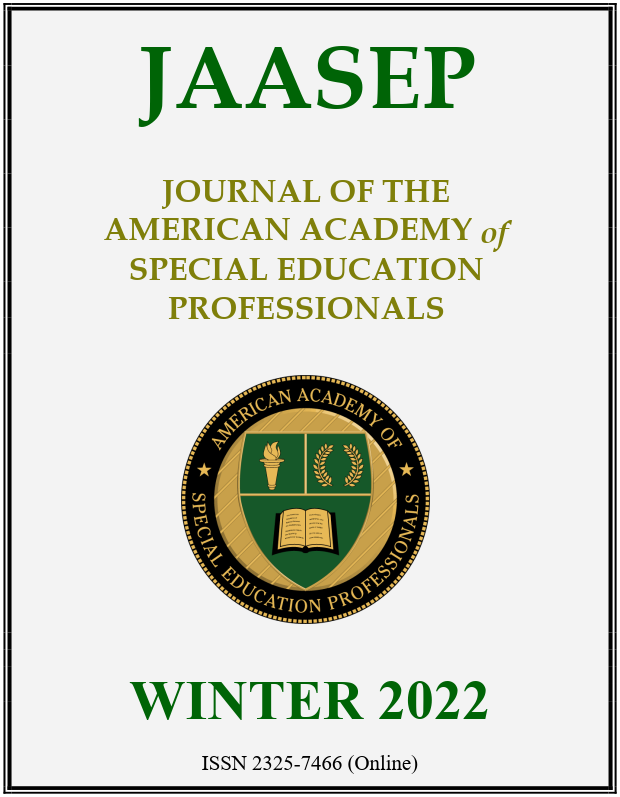Perceptions of the Efficacy of Classroom Management Techniques
Alter, P., & Haydon, T. (2017). Characteristics of effective classroom rules: A review of the literature. Teacher Education and Special Education, 40(2), 114–127. https://doi.org/10.1177/0888406417700962 DOI: https://doi.org/10.1177/0888406417700962
Anderson, C. M., & Spaulding, S. A. (2007). Using positive behavior support to design effective classrooms. Beyond Behavior, 16(2), 27–31.
Back, L. T., Polk, E., Keys, C. B., & McMahon, S. D. (2016). Classroom management, school staff relations, school climate, and academic achievement: Testing a model with urban high schools. Learning Environments Research, 19(3), 397-410. https://dx.doi.org/10.1007/s10984-016-9213-x DOI: https://doi.org/10.1007/s10984-016-9213-x
Bahceci, F. (2019). CLASSDOJO: The effects of digital classroom management program on students-parents and teachers. International Online Journal of Educational Sciences, 11(4), 160–180. https://doi.org/10.15345/iojes.2019.04.012 DOI: https://doi.org/10.15345/iojes.2019.04.012
Bucher, K. T., & Manning, M. L. (2001). Exploring the foundations of middle school classroom management. Childhood Education, 78(2), 84. https://doi.org/10.1080/00094056.2002.10522709 DOI: https://doi.org/10.1080/00094056.2002.10522709
Bucher, K. T., & Manning, M. L. (2013). Classroom management: models, applications, and cases. Boston: Pearson.
Collier-Meek, M. A., Johnson, A. H., Sanetti, L. H., Minami, T., & Eckert, T. (2019). Identifying Critical Components of Classroom Management Implementation. School Psychology Review, 48(4), 348–361. https://doi.org/10.17105/SPR-2018-0026.V48-4 DOI: https://doi.org/10.17105/SPR-2018-0026.V48-4
Collier-Meek, M. A., Sanetti, L. M. H., & Boyle, A. M. (2019). Barriers to implementing classroom management and behavior support plans: An exploratory investigation. Psychology in the Schools, 56(1), 5–17. https://doi.org/10.1002/pits.22127 DOI: https://doi.org/10.1002/pits.22127
Egeberg, H. M., McConney, A., & Price, A. (2016). Classroom management and national professional standards for teachers: A review of the literature on theory and practice. Australian Journal of Teacher Education, 41(7), 1-18. DOI: https://doi.org/10.14221/ajte.2016v41n7.1
Englehart, J. (2012). Five Half-Truths about Classroom Management. The Clearing House, 85(2), 70-73. DOI: https://doi.org/10.1080/00098655.2011.616919
Hagermoser-Sanetti, L. M., Williamson, K. M., Long, A. C., & Kratochwill, T. R. (2018). Increasing in-service teacher implementation of classroom management practices through consultation, implementation planning, and participant modeling. Journal of Positive Behavior Interventions, 20(1), 43-59. DOI: https://doi.org/10.1177/1098300717722357
Herman, I. R. (2019). Study on the impact of the continuous training program classroom management-effective strategies. Journal Plus Education / Educatia Plus, 25(2), 155– 163.
Jones, V. F. (2015). Practical Classroom Management. Upper Saddle River, NJ: Pearson.
Kennedy, M. J., Hirsch, S. E., Rodgers, W. J., Bruce, A., & Lloyd, J. W. (2017). Supporting high school teachers' implementation of evidence-based classroom management practices. Teaching and Teacher Education, 63, 47-57. DOI: https://doi.org/10.1016/j.tate.2016.12.009
Korpershoek, H., Harms, T., de Boer, H., van Kuijk, M., & Doolaard, S. (2016). A meta-analysis of the effects of classroom management strategies and classroom management programs on students’ academic, behavioral, emotional, and motivational outcomes. Review of Educational Research, 86(3), 643-680. DOI: https://doi.org/10.3102/0034654315626799
Kwok, A. (2019). Classroom management actions of beginning urban teachers. Urban Education, 54(3), 339–367. https://doi.org/10.1177/0042085918795017 DOI: https://doi.org/10.1177/0042085918795017
Lester, R.R., Allanson, P.B., & Notar, C. E. (2017). Routines are the foundation of classroom management. Education, 137(4), 398–412.
Long, A. C. J., Renshaw, T. L., & Camarota, D. (2018). Classroom management in an urban, alternative school: A comparison of mindfulness and behavioral approaches. Contemporary School Psychology, 22(3), 233-248. http://dx.doi.org/10.1007/s40688-018-0177-y DOI: https://doi.org/10.1007/s40688-018-0177-y
Mitchell, B. S., Hirn, R. G., & Lewis, T. J. (2017). Enhancing effective classroom management in schools: Structures for changing teacher behavior. Teacher Education and Special Education, 40(2), 140–153. https://doi.org/10.1177/0888406417700961 DOI: https://doi.org/10.1177/0888406417700961
Moore, T. C., Wehby, J. H., Oliver, R. M., Chow, J. C., Gordon, J. R., & Mahany, L. A. (2017). Teachers’ reported knowledge and implementation of research-based classroom and behavior management strategies. Remedial and Special Education, 38(4), 222-232. DOI: https://doi.org/10.1177/0741932516683631
Nagro, S. A., Fraser, D. W., & Hooks, S. D. (2019). Lesson planning with engagement in mind: Proactive classroom management strategies for curriculum instruction. Intervention in School and Clinic, 54(3), 131–140. https://doi.org/10.1177/1053451218767905 DOI: https://doi.org/10.1177/1053451218767905
Oliver, R.M., Wehby, J.H., and Nelson, J.R. (2015). Helping teachers maintain classroom management practices using a self-monitoring checklist. Teaching and Teacher Education, 51, 113-120. https://doi.org/10.1016/j.tate.2015.06.007 DOI: https://doi.org/10.1016/j.tate.2015.06.007
Sieberer-Nagler, K. (2016). Effective classroom-management & positive teaching. English Language Teaching, 9(1), 163-172. DOI: https://doi.org/10.5539/elt.v9n1p163
Van Tartwijk, J., den Brok, P., Veldman, I., & Wubbels, T. (2009). Teachers’ practical knowledge about classroom management in multicultural classrooms. Teaching and teacher education, 25(3), 453-460. DOI: https://doi.org/10.1016/j.tate.2008.09.005
Downloads
Article Information
- Article Type Articles
- Submitted January 16, 2022
- Published February 15, 2022
- Issue Winter 2022
- Section Articles
